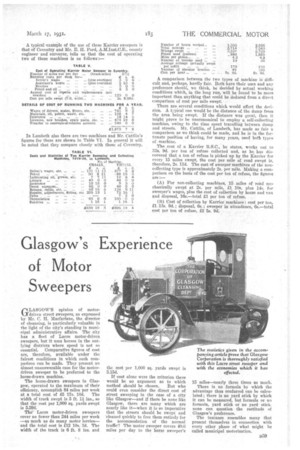Glasgow's Experience of Motor Sweepers
Page 129

If you've noticed an error in this article please click here to report it so we can fix it.
QI.JASGOW'S opinion of motordriven street sweepers, as expressed by Mr. C. H. Macfarlane, the director of cleansing, is particularly valuable in the light of the city's standing in mini-cipal administrative affairs. The city has a fleet of Lacre motor-driven sweepers, but it uses horses in the outlying districts where speed is not so essential. Comparative figures of cost are, therefore, available under the fairest conditions in which such comparison can be made. They present an almost unanswerable case for the motordriven sweeper to be preferred to the horse-drawn machine.
The horse-drawn sweepers in Glasgow, operated to the maximum of their efficiency, accomplish 84 miles per week at a total cost of £5 17s. 10d. The width. of track swept is 5 ft. 1 ins., so that the .eost per 1,000 sq. yards swept is 5.59d.
The Lacre motor-driven sweepers cover no fewer than 244 miles per week -as much as do many motor lorriesand the total cost is £12 10s. 3d. The width of the track is 6 ft. 8 ins. and the cost per 1,000 sq. yards swept is 3.15d.
If cost alone were the criterion there would be no argument as to which method should be chosen. But who could even consider the direct cost of street sweeping in the case of a city like Glasgow-and if there be none like Glasgow, there are many which are nearly like it-when it is so imperative that the streets should be swept and -cleaned quickly to free them entirely for the accommodation of the normal traffic? The motor sweeper covers 40.6 miles per day to the horse sweeper's
15 miles-nearly three times as much.
There is no formula by which the advantage thus conferred can be calculated; there is no yard stick by which it can be measured, but formula or no formula, yard stick or no yard stick. none can question the rectitude of Glasgow's preference.
The instance resembles many that present themselves in connection with every other phase of what might be called municipal motorization.
























































































































































































